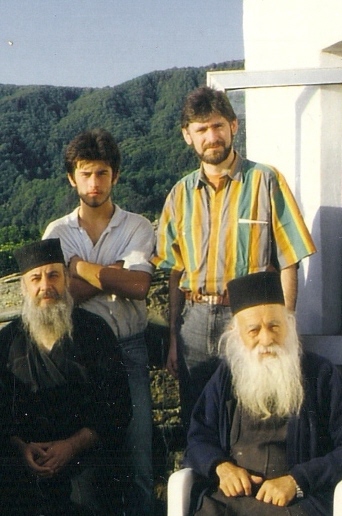
____________________________________________________________
Ikonenmaler Kosmas und Meletios o Sikiotis (Karies, Berg Athos) mit Ikonenmalschüler und Martin Gerhardt
Buchempfehlung: Sydney Loch, ATHOS ~ The Holy Montain, Librairie Molho, Thessaloniki, 1957/1971. Mit den Malermönchen Kosmas und Meletios o Sikiotis, Maler der Petrus-Andreas-Ikone, die der ökomensiche Patriarch von Konstantinopel, Athenagoras, Papst Paul VI. bei der histo-rischen Begegnung in Jerusalem schenkte. Sie wurde ein Symbol für die Wiederbelebung des Dialog zwischen Ost- und Westkirche. ____________________________________________________________
Athos is a peninsula streching into the Aegean. The first monks were there before the Conqueror came to Eng-land; it is unique, a womanless land dedicated to the same way of life for a thousand years. The author of this brilliant book came to live in the first village beyond the wall of Athos thirty years ago. He was an honoured guest everywhere on Athos, and he knew it as few lay-men do; the great monesteries, their splendid churches, the ikons and their legends; the hard-labouring kelliotes, the shy cliff-perched hermits. He knew the every-day life and the people of the Mountain; the wit, character, kind-ness, shrewdness of the beardet monks; the guest-masters speeding the morning traveller with a glass of water, a spoonful of jam, and a cup of Turkish coffee; the traveling salesmen, fishermen, charcoal-burners, and the tourists who travel on the paths and round the shores of the Mountain. In his book he shows us the living world of Athos. - Sydney Loch was a Scotsman. He first went to Greece when the vast movement of Greeks from Asia Minor was beginning, under the League of Nations. He settled in Phosphori Tower in 1928. At the outbreak of the Second World War he was asked by the Quakers to go to the help of the Poles, who were then streaming in-to Rumania; he returned to Greece in 1944 to work on relief with the first British Military Liaison unit; in 1952 he geturned to Phosphori. The monks, the fishermen und charcoal burners were his friends. He meet hermits on their own ground, realized the spiritual urge and powers of self-discipline wich drove them to solitude and wind-swept cliffs. Seldom has a layman been greeted with such affection in monastery or hut. He died suddenly in February 1954, sitting over his fire, ten minutes after going out into the snow to identify a pelican. He had that day finished typing outh the sixth chapter of the book. He had completed the manuscript, but did not revise it. He was married in 1919, and his wife shared he adventurous life with him. After his death she remained on at Phosphori in order to edit and type the book in the atmosphere in wich it was written.
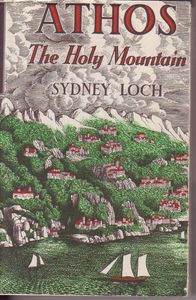
Joice Nankivell Noch
(Australia 1893 - Prosforion 19829 war in Ouranopolis für die Ansiedlung der aus der Türkei vertriebenen Griechen zuständig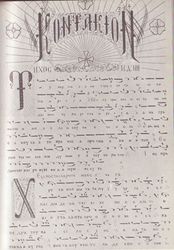
Hymnus mit bis heute auf dem Athos gebräuchlichen Neumen, übertragen aus einem mittelalterlichen Manuskript von Meletios o Sikiotis
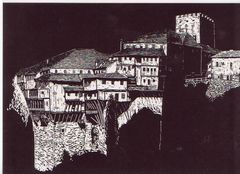
Linolschnitte von Reinhard Zwerger Koster Dionysiou 1976 ~ Berg Athos
Megistis Lavras 1975 ~ Berg Athos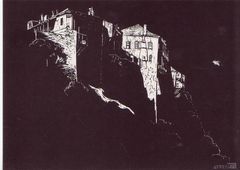
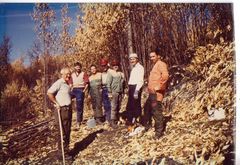
Reihard Zwerger (daneben rechts Martin Gerhardt) im Wald von Si- monos Petras, Berg Athos, bei den "Blauen Quellen". Holzfällaktion nach dem großen Feuer. Rechts: Kirchberg im Wechsel, Österreich, links unten, neben der Klosterkirche das Wohnhaus der Zwergers, wo ich sie besuchten durfte.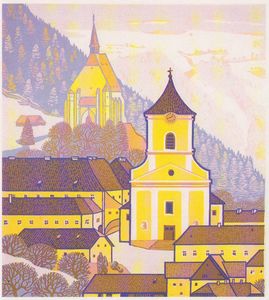
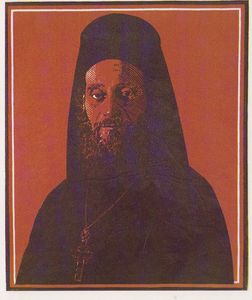
Abt Aimilianos (+) vom Athoskloster Simonos Petras, Linolschnitt von Reinhard Zwerger. Rechts das Haus der Ikonenmalermönche Johannes & Antonios, Kafsokalyvia, Berg Athos. 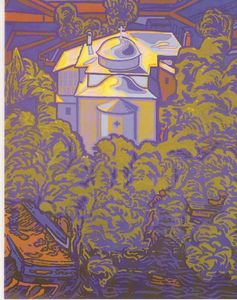
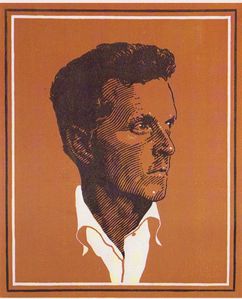
Philosoph Wittgenstein ~ Linolschnitt Reinhard Zwerger, dessen Vater zur gleichen Zeit Dorfschullehrer in einer Nachbargemeinde war. "Burgenland bei Unterpullendorf", 1962, erinnert mich an einen Kindheitsbusch auf dem Bad Emser Hasenberg.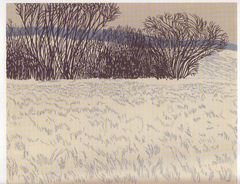
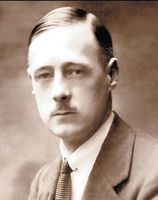
Joice Nankivell Loch
(auch seine Grabinschrift)
E XU L T A T I O N
WHY SHOULD YOU CRY?
DO YOU THINK I LIE
QUIETLY, SILENTLY UNDER THE SKY
AND WIST NOT THE MURMERING WIND STEAL BY? ...
Frohlocken
Warum solltest du wehklagen ?
Denkst du ich liege
stumm und schweigend unter dem Himmel
und merke nicht den murmelnden Wind vorbei streichen? ...
(Übersetzung: Martha Hanschin, Ouranopoulis, Schweizer Bürgerin, Angestellte bei den Loch's)